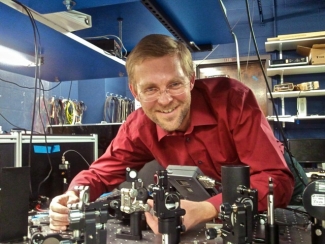Markus Raschke has been given a Friedrich Wilhelm Bessel Research Award by the Humboldt Foundation. The award is given in recognition of lifetime achievements in research. Award winners are invited to conduct reseach projects of their choice in cooperation with colleagues in Germany, with the goal of promoting international scientific cooperation. The Humboldt Foundation annually grants about 20 of these awards, which are valued at 45,000 Euros. Award winners are invited to spend up to one year collaborating on a long-term research project with colleagues at a research institution in Germany. This period of collaboration may be divided into blocks of time.
Raschke was nominated for this prestigeous award by Prof. Dr. Martin Wolf of the Fritz Haber Institute of the Max Planck Society (FHI), Berlin Germany. Raschke joins other young scientists who completed ther doctorates less than 18 years ago and who have also become internationally renowned in their field. In bestowing this award, the Humboldt Foundation expects the awardees to continue producing cutting-edge research achievements that have influence well beyond their immediated field of work.
Nominations for this award come from established academics in Germany. Congratulations Markus!



 The Physics Frontiers Centers (PFC) program supports university-based centers and institutes where the collective efforts of a larger group of individuals can enable transformational advances in the most promising research areas. The program is designed to foster major breakthroughs at the intellectual frontiers of physics by providing needed resources such as combinations of talents, skills, disciplines, and/or specialized infrastructure, not usually available to individual investigators or small groups, in an environment in which the collective efforts of the larger group can be shown to be seminal to promoting significant progress in the science and the education of students. PFCs also include creative, substantive activities aimed at enhancing education, broadening participation of traditionally underrepresented groups, and outreach to the scientific community and general public.
The Physics Frontiers Centers (PFC) program supports university-based centers and institutes where the collective efforts of a larger group of individuals can enable transformational advances in the most promising research areas. The program is designed to foster major breakthroughs at the intellectual frontiers of physics by providing needed resources such as combinations of talents, skills, disciplines, and/or specialized infrastructure, not usually available to individual investigators or small groups, in an environment in which the collective efforts of the larger group can be shown to be seminal to promoting significant progress in the science and the education of students. PFCs also include creative, substantive activities aimed at enhancing education, broadening participation of traditionally underrepresented groups, and outreach to the scientific community and general public.